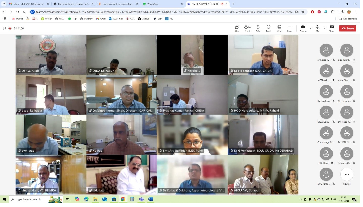14 May 2025, Hyderabad
In a proactive step to strengthen contingency planning for the upcoming Kharif season, the ICAR-Central Research Institute for Dryland Agriculture, Hyderabad, in collaboration with the Department of Agriculture, Government of Maharashtra, organized a virtual interface meeting on “Enhancing the Preparedness of Agricultural Contingencies for Kharif 2025”.
The meeting saw the participation of several key officials, including Shri Suraj Mandhare, Commissioner, Agriculture, Government of Maharashtra; Dr. V.K. Singh, Director, ICAR-CRIDA; Shri Parimal Sing, Director, POCRA, Mumbai; Shri R.S. Naikwadi, Director (Extension & Training), Department of Agriculture, Government of Maharashtra; and representatives from agricultural universities including VNMKV Parbhani.

In his opening address, Dr. V.K. Singh emphasized the significance of the meeting and shared insights on the seasonal rainfall forecast issued by IMD. He underlined the importance of taking timely adaptive measures to mitigate the impacts of weather anomalies, especially in the context of Maharashtra’s variable climatic conditions.
Addressing the state’s preparedness, Shri R.S. Naikwadi outlined the Kharif 2025 crop planning, identifying key crops, target areas, input availability, and the implementation of crop monitoring programs. He confirmed that while adequate seed stocks are available for most crops, there are shortfalls for cotton and pigeonpea. He further recommended the adoption of the Broad Bed Furrow (BBF) system, especially for pigeonpea, to facilitate drainage in the event of heavy rainfall.
Additional and Joint Directors of Agriculture from various districts shared detailed updates on field-level preparedness and contingency strategies, including the promotion of alternative crops and varieties suitable for different agro-climatic zones.
The meeting also saw discussions on enhancing institutional coordination and improving the dissemination of weather advisories to farmers, particularly related to short-term rainfall forecasts and potential waterlogging conditions.
Scientists from various ICAR institutes, All India Coordinated Research Projects on Dryland Agriculture (AICRPDA) and Agrometeorology (AICRPAM), as well as Project Coordinators of Krishi Vigyan Kendras (KVKs) across Maharashtra, also attended the session.
The meeting marked an important step towards climate-resilient agriculture in Maharashtra, underscoring the critical role of coordinated planning, timely advisories, and scientific interventions in managing agricultural contingencies.
(Source: ICAR-Central Research Institute for Dryland Agriculture, Hyderabad)








Like on Facebook
Subscribe on Youtube
Follow on X X
Like on instagram